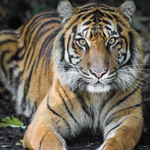Indonesian fires: Are we looking away?10th November 2015  This comment is an adaptation of an article Margi Prideaux has written on WildPolitics. This comment is an adaptation of an article Margi Prideaux has written on WildPolitics.
Smoke from the massive wildfire ranging out of control in Sumatra and Borneo has already pushed up pollution to dangerous levels across parts of Indonesia, Malaysia, Singapore and southern Thailand, disrupting flights and closing schools. Reports from a few weeks ago said that at 307,360 people in six Indonesian provinces, from June 29 to October 5, 2015, sought medical treatment for respiratory problems and other diseases caused by smoke or haze.
While the Convention of Biological Diversity remains silent, the GRASP Ambassadors–Jane Goodall, Richard Leakey, Russell Mittermeier, Richard Wrangham and Nadya Hutagalung–have released a hard hitting statement. They are "… aghast at the forest and peat fires in Sumatra and Borneo that continue to grow and threaten the populations, wildlife and ecosystems of Indonesia."
The UN Environment Programme (UNEP) has spoken out as well. UNEP has observed with increasing alarm the spread of forest and peat fires on the islands of Sumatra, Borneo and Papua. We are deeply concerned about the effects these fires are having not only on the health of local populations, ecosystems and wildlife, but the global climate as well.
So, some intergovernmental bodies are speaking–but not all. But, where is the mainstream conservation movement?
At present, if you hear an NGO voice is is probably an animal rescue organisation, facilitating news to the wider world through social media. These important organisations are focused on rescuing wildlife in the line of whatever real or metaphorical fire might be threatening them–be it a wildfire in the jungle, a zoo being bombed in a war zone, flooded habitat or massive drought forcing interactions with starving people. Its their mandate, their task. The messaging from these vital, and often very small animal rescue organisations is not the problem. The absence of the mainstream conservation movement is.
Friends of the Earth are the anomaly. They are public–leading the charge. WWF and Greenpeace are the only others I have found commenting, and these two focus on their Indonesian offices, treating it as a local story. As of early November most of the large prominent NGOs have not registered a statement of concern on the front pages of their websites. The conservation movement seems to be collectively looking away.
These fires are so much more than a local issue. Sutopo Puro Nugroho, a spokesperson for the Indonesian Meteorology, Climatology and Geophysics Agency (BMKG) has called the fires “a crime against humanity of extraordinary proportions.” The World Resources Institute estimates that the current Indonesian fires are producing more carbon pollution than the daily emissions from whole of US economic activity.
Indonesia’s tropical forests represent some of the most diverse and important habitats on the planet. The region is rich with universally important biodiversity and is home to clouded leopards, sun bears, orangutans, gibbons, the Sumatran rhinoceros and Sumatran tiger. The current fire outbreak adds to decades of existing deforestation by palm oil, timber and other agribusiness operators. They have already shortened window to reduce carbon emissions and avoid runaway climate change by two years, according to one of Australia’s leading climate scientists.
Companies–big and small–must be held to account. The World Resources Institute suggests that a third of the fires in Sumatra are occurring on pulpwood concessions most of the rest are on or near land used by palm oil producers. Many are calling on the Indonesian government to step up. WFF-Indonesia has told the Guardian the Indonesian government action lacks clout and “has not yet resulted in deterrent effect to prevent any recurrence”.
As the Paris Climate talks approach will the mainstream conservation movement will recognize their responsibility and call for urgent and immediate action–from Indonesia, Malaysia and Singapore and the multinational industries directly involved–in recognition of the global nature of this event.
Wild Migration champions the role and the power of civil society. But that role and power carries a responsibility–we can not look away.
***
Margi Prideaux is writing a book, Birdsong After the Storm, about the urgent need for collaboration at the international governance table to secure what is precious in the face of an unprecedented ‘storm’ of environmental and political change facing the world.
|











